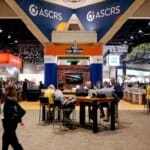

The Tap Room has evolved to become the ‘town square’ of ASCRS’ annual meeting, metaphorically and physically — it is now located in the middle of the show floor.
The pandemic accelerated almost every trend that was burgeoning at associations, Steve Speares, executive director, American Society of Cataract & Refractive Surgery (ASCRS), told Convene. “One of those — which was a really tricky political thing inside of a member society — was awards.”

Steve Speares
‘It wasn’t like, “Hey, let’s build a bar.” It was that we were building a gathering place’
Historically at ASCRS, Speares said, “awards were sacrosanct,” with ceremonies taking place as part of several general sessions at the annual meeting. “We even had added a couple of awards for good measure because there weren’t enough awards,” he said with a laugh. “We thought, ‘Hey, one thing that people love to do is get awards, so we should put more awards in.’”
But that was, he said, a boomer assumption. And “as we came out of the pandemic, we started to get a sneaking suspicion that our awards don’t mean to our younger members what we thought they meant,” Speares said. “They may not even mean to our middle-career members what we as baby boomers thought they meant.”
ASCRS worked with Freeman to do a deep dive, including in-depth interviews on site, to gain insight from their attendees about how they felt about the awards as well as other aspects of the annual meeting. The results confirmed “our instincts and our spidey vision that not only did our younger members really not have interest in the awards, they were almost oblivious to the fact that these awards existed,” Speares said. What they really were interested in was engagement, he said. “They love the idea of talking to these past award winners, but not because they were award winners, rather because they were savants — they were really highly experienced, highly educated, and very wise ophthalmologists.”

In more recent editions of the Tap Room than the above, television monitors have been added, tuned to sports events as another way to attract attendees.
‘Precious Time’
As for mid-career members, the survey results revealed that while they may have had a greater awareness of some of the awards, “they saw the time that they had at the meeting as precious and they wanted to get the maximum value out of it,” Speares said. For them, attending ASCRS is “a true investment.” These physician attendees, especially if they work in a medical practice, miss out on several days of seeing patients and therefore lose revenue, so it’s even more important for them to make their time at the annual meeting count.
“This is going to sound cold and it’s not meant to,” Speares said. “It’s just the generational shift and what people find important — they really didn’t care to hear about how someone arrived at this zenith of being such a prominent contributor to the field of ophthalmology. They love the fact that these people made these contributions; they just didn’t want to spend their precious time in a large room watching videos that were like an Academy Awards ceremony. Simultaneously, we realized as an organization, we’re spending a heck of a lot of money to try to ensure that we properly celebrated these individuals.”
Nearly all of the awardees were boomers, with a few Gen Xers who were joining their ranks, Speares said. “That was probably the most disconcerting part — you would think, ‘Oh, well, some of them are teachers so they’re friends and they’re protégées. They’re going to come and they’re going to cheer and watch this.’ But no.”
Speares said he later learned that several years before he joined ASCRS, programming that competed with — held at the same time as — those award ceremonies was eliminated with the goal of compelling people to attend. But that didn’t pan out, he said. Attendees didn’t like only having the option to attend the awards, they wanted to be given multiple education tracks to choose from. It wasn’t a good thing for ASCRS industry partners, either. “By locking out all other programming during those times, that meant that the historically larger break times in the exhibit hall became condensed because we had to shove in those programming moments into those breaks of time,” Speares said.
“As a baby boomer, it was a cold, hard truth for me. I enjoyed those ceremonies. I enjoyed hearing the anecdotes and the stories. But when I took a step back and considered my responsibility as the executive director and the welfare of our organization — and our meeting, especially — we could not ignore the data. We could not whistle through the graveyard, as I’ve told my staff. We made a big, tough, politically unpopular decision to consolidate all of our awards, basically, into these very much shorter timeframes. The actual award ceremony itself no longer includes a drawn-out video that goes back over the career of these individuals. Rather, what we’ve chosen to do is to focus on the clinical achievements and the impact that those achievements have had on our field.”
Cheers to That
And that’s where the ASCRS Tap Room comes in — by giving attendees access to those awardees. For its 2020 annual meeting in May in Boston, ASCRS had the idea of building a Cheers bar in the middle of its exhibit hall, Speares said, a nod to the destination where the iconic TV sitcom was based. “That was our big plan.” But the pandemic scuttled those plans when the meeting was canceled.
Part of the Cheers goal was to increase traffic on the show floor. “Getting people into the exhibit hall was becoming more and more challenging,” Speares said. “At least in medicine, for us, the reason was you could get a lot of the information that was available in the exhibit hall online, and you could get a lot of the context from the sales representatives in your office. You just call on them and they come to you, especially in medicine, where there is more and more control put on sales reps’ interaction with physicians. Sales reps were happy when you asked them, ‘Hey, can you come to my office? I was at the meeting and I didn’t have time to get by the booth.’”
The association’s early stages of work with Freeman showed Speares that when people come to this meeting, they’re also looking for a chance to make connections. “We all know in the world that we live in, people are having greater and greater difficulty connecting with each other,” Speares said. “How this ties back to the awards: When we did come out of the pandemic, we went all in” on the Cheers concept, which became the Tap Room, he said. “It became exactly what we hoped it would be. It’s a place where people come, they take a load off, they sit for a while, they have an adult beverage or a cola or coffee, and they sit and they talk to other people. It became a natural networking arena for industry and for physicians.”
By taking time away from general sessions that was dedicated to awards, ASCRS allocated time for informal discussions, where “people can actually have Q&A with some of these award winners in our Tap Room,” Speares said. One of the awards that resonates with attendees is “a humanitarian award that is generously endowed by one of our past presidents who really believes in giving back to the world. We honor those individuals who have had a huge impact on global ophthalmology in their service.” Giving attendees the chance to ask awardees how they got their start in philanthropy appeals to them — “they really want to make sure that they’ve got that noted in their schedule,” he said, so, a timeslot is put into the program and promoted. “Then hopefully, what happens is, as people are making their way into or out of the Tap Room, they’ll also spend some time with our exhibit partners.”
From Booth to Bar
The Tap Room also fulfilled another purpose. Freeman worked with ASCRS “to shift the budget from the association management booth” it had on the show floor, which was also a learning resource center, “into a much more functional component,” Ken Holsinger, Freeman senior vice president, strategy, told Convene during the conversation with Speares.
“I used to walk by the [association’s booth] and it was a ghost town,” Speares said. “When this Cheers idea was proposed, I was pretty new in my role, and I wasn’t sure how the notion of, ‘Hey, we’re going to build a bar in the middle of a medical scientific conference’” would go over. “I think context is important. It wasn’t like, ‘Hey, let’s build a bar. Let’s get hammered.’ It was that we were building a gathering place.”
The Tap Room is outfitted with televisions tuned to sports events as another incentive to attract attendees. “One year, our meeting was held during the Masters Golf Tournament, and people don’t want to miss that, so you say to them while you’re promoting the meeting, ‘And don’t forget to come to the Tap Room to watch XYZ and keep up with the latest that’s going on in the NBA playoffs,’ for instance,” Speares said.

Ken Holsinger
‘By understanding the attendee, what they want, how they express that, how we design environments for them — the entire ecosystem will work.’
Whereas the association booth was more “static,” Holsinger said, the Tap Room transformed the show floor “from being a dead zone to being sought after. It’s become a real estate magnet.”
Which, he said, “ties to this subject matter/expert award piece. That environment — one minute it’s a gathering place for people just hanging out, and the reception is happening there. The next minute, there’s an educational pop-up from an industry partner in the corner. The next minute, there’s a pop-up with a book author — or a subject matter expert being given an award in this new format.”
The Tap Room “truly has become the town square of the event,” Holsinger added. “In fact, we moved it. It was off to one side, and now it’s in the middle.”
Listening to the data enabled ASCRS to drive this opportunity, he said. “We need to constantly be understanding what it is our attendees want. If you nail that, your exhibit partners will be happy. Often, [organizers] make the mistake of asking, ‘What does industry or the exhibit partner want?’ at the expense of the attendee. By understanding the attendee, what they want, how they express that, how we design environments for them — the entire ecosystem will work. If there’s a problem with your show floor,” he said, it probably means “you’re not engaging attendees correctly. I think listening to the attendees is really the overall theme of what Steve and his team have done in such a powerful way.”

A popular gathering spot, the Tap Room has spillover benefits for exhibitors.
Access to SMEs
It isn’t that ASCRS eliminated its awards program, Freeman’s Ken Holsinger said, “they’ve been more selective, they’ve changed the format.” Some associations have recognized that younger attendees don’t like the award ceremonies, so they just “speed them up. That’s not necessarily helpful, either.”
On the other hand, other associations are appealing to younger members by making awards a special recognition on social media rather than a formal ceremony, he said, where “it gets more amplification, they’re able to post and repost and people can come in and share thoughts.”
ASCRS’ shift to make its awards a more interactive experience dovetails with recent Freeman research that shows that attendees not only want to network, “they want to connect with subject matter experts,” Holsinger said.
“We’re encouraging exhibitors to bring more subject matter experts and fewer salespeople and have deeper conversations. I observed it with ASCRS so strongly. They have heroes of the science that these young doctors want to interact with. This opportunity to really highlight them as subject matter experts almost brings together all of the trends at once,” he said.
“I like to say we can architect the opportunity for serendipity. I think that’s what Steve [Speares] and his team at ASCRS have done to really optimize that environment,” Holsinger added. “It’s hitting all the buttons. You’ve got the networking, you’ve got the subject matter expertise, you have the shift of awards and the return on time and the flexibility — they all come together in a really magical way.”
Michelle Russell is editor in chief of Convene.
On the Web
- Learn more about the ASCRS Annual Meeting.
- Learn more about Freeman’s research.




